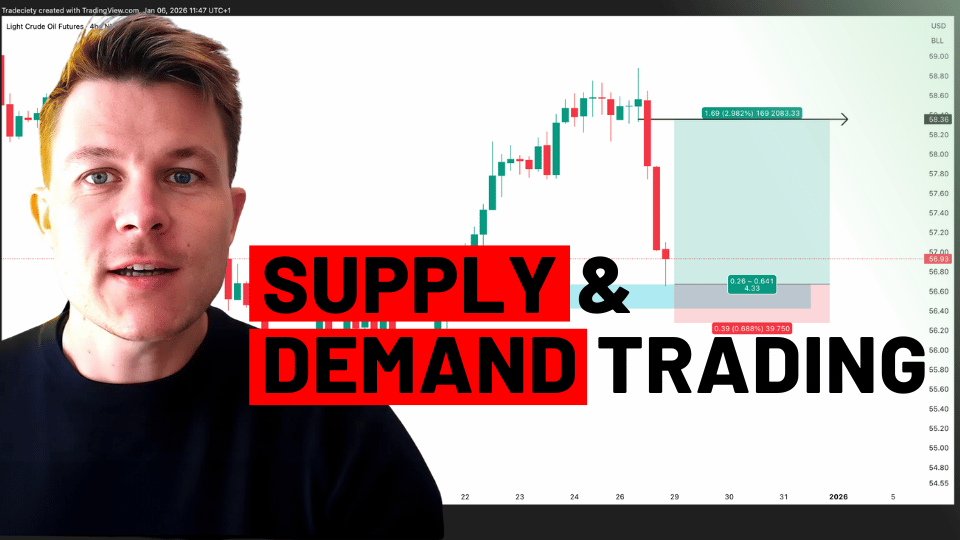Supply and Demand Trading in 2026
We have been trading supply and demand strategies for over ten years, and they have stood the test of time remarkably well. Supply and demand is...

In the world of online trading, developing a set of successful trading habits is crucial for anyone looking to achieve consistent profitability.
We have mentored thousands of traders over the years and in this article, we explore the top 10 trading habits that have proven effective for traders. From the importance of disciplined risk management to the need for ongoing improvement, these habits are the cornerstone of a successful trading approach. Whether you're a novice just starting or an experienced trader looking to refine your approach, these insights offer valuable guidance.
"The goal of a successful trader is to make the best trades. Money is secondary."
- Alexander Elder

Prioritize making well-thought-out trades over a high volume of trades. Typically, traders who are more selective and have fewer trades, realize better trading results. Instead of trading every signal you come across, only choose the absolute best trading opportunities that fit into your framework.
For that, a trader needs to have a good understanding of their trading strategy and be clear about the strategy rules. Look at your past trades and find 10 examples of textbook signals. Then write down what they have in common. This will quickly help you create a set of rules for your trades and allow you to be more selective.
A trade is more than an entry. Successful traders often have a well-thought-out trading plan that includes risk management strategies, entry and exit points, and clear objectives. Whenever you find yourself in a situation where you do not know how to respond, write it down and then create a new rule for your trading framework.
Ideally, you have a clear plan for your complete trade from start to finish before you even pull the entry trigger. Such an approach will also help traders be more confident in their decisions and experience less doubts and fear.
"Don’t focus on making money; focus on protecting what you have."
- Paul Tudor Jones
Implementing stop-loss orders and position sizing based on the risk tolerance of the trader helps in managing potential losses and getting out of drawdowns without severe damage.
First of all, every trade needs to have a stop loss in place. You should know your worst-case price level where you are going to close the trade. When the price hits your stop, the price action has confirmed that your trade idea didn’t work this time.
Second, you need to establish a rule for your standard position size. How much are you going to risk per trade? Every trade should follow the same position size to value every trading opportunity the same. Inconsistencies in your position sizing will lead to inconsistencies in your account growth.
"The key to trading success is emotional discipline. If intelligence were the key, there would be a lot more people making money trading."
- Mark Douglas

Many traders mistakenly believe that they have to trade without emotions and suppress them. They see their emotions as an enemy that negatively affects their trading.
However, it is not possible to eliminate your emotions. Emotions are there for a reason and they can be helpful if used the right way.
Instead of trying to suppress the emotion, try to listen carefully to what the emotion is telling you. When you feel an intense emotion, something is going on that needs your attention. You might have taken too much risk, broken your entry rules, or deleted your stop-loss order. In such cases, intense emotions are the right response from your body because you are looking at a potential threat – not physically, but to your trading capital.
A good trader, therefore, listens to the emotions that are coming up and then takes action to correct the situation. Let your emotions be your guide.

Successful traders regularly review their trades to understand what worked and what didn’t, enabling them to learn from their successes and mistakes.
Especially during drawdowns and losing streaks, revisiting your trading journal and going over each trade will provide important insights into your trading behavior. Many traders repeat negative trading decisions that are costing them a lot of money. A trading journal will show you where you are leaving money on the table, bringing awareness to your flaws.

"The big money is not in the buying and selling, but in the waiting."
- Jesse Livermore
Patience plays a role on three different levels in trading and it is one of the most important traits a trader needs to develop.
First, a trader needs to wait patiently for the right trading opportunity and ignore the noise.
Second, once in a trade, a trader needs to be patient with the price development. Many traders cut their winners too soon and leave money on the table.
Finally, traders need to be patient with their account growth. Trying to grow your trading account too quickly inevitably leads to bad results.
Establish clear, achievable goals for both short-term and long-term trading.
Short-term goals should be process-oriented goals such as following your trading plan, not breaking trading rules, journaling all trades, and making sure that all trades are sized correctly. Short-term profit goals must be avoided because traders cannot control how much they will be able to take out of the market.
Regularly reviewing your progress is also beneficial. Many traders forget how far they have already come in their journey. You might not be where you want to end up, but looking back and seeing how far you have come will help build confidence and reassure you that you are on the right path.
Consistency in applying a trading strategy is key, as it allows for a more accurate assessment of its effectiveness over time.
A lot of traders engage in system-hopping, constantly going from one trading strategy to the next. You have to avoid this at all costs. The temptation to change your trading strategy after your first losses is high but you have to push through this and loop deeper.
Choose a trading strategy and stick to it, no matter what. Instead of getting discouraged after a loss, go back to your trading journal and find ways how you can improve your trading. Over time, you can refine your trading approach and improve your strategy.
Dealing with losses is part of trading. Developing the resilience to bounce back and learn from losses is crucial.
Losses are a normal part of trading and even the best traders of all times typically have a winrate of 40% - 60%. No matter how good you are, you will not be able to avoid losing trades.
The faster you can be comfortable taking losses, the faster you can advance as a trader. The key is to not get losses out of hand.

Successful traders understand the importance of disconnecting and recharging, as it supports maintaining mental sharpness and decision-making ability.
Trading is not everything and life is more than just charts and price action. Many traders derive their self-worth from their trading results when trading takes over their whole life. This is a slippery slope because losses and drawdowns are inevitable.
Having hobbies outside of trading and maintaining balance will help you bounce back from drawdowns. Having a support network, and spending time with family and friends is also hugely beneficial for your mental health and will feed back positively to your trading.
It is impossible to rank the ten listed habits and tips in order of importance. Ideally, a trader can cultivate most of the trading habits listed in this article.
However, you also do not want to overwhelm yourself by trying to fix everything at once. Instead, pick one to three from this list and work on them with focus for a few weeks to build momentum once you start seeing results. Over time, you will be able to change your trading for the better.

We have been trading supply and demand strategies for over ten years, and they have stood the test of time remarkably well. Supply and demand is...

3 min read
Choosing the right trading journal is essential for traders wanting to analyze performance, refine strategies, and improve consistency. In this...

3 min read
“95% of all traders fail” is the most commonly used trading related statistic around the internet. But no research paper exists that proves this...